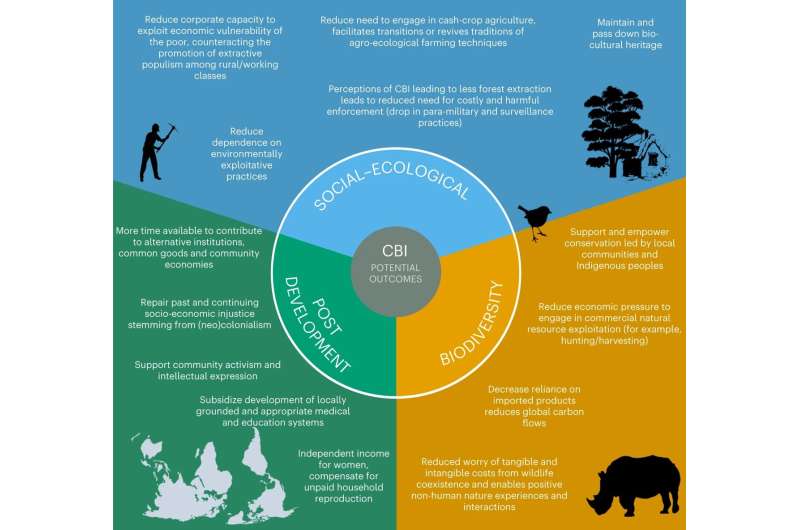This article has been reviewed according to Science X's editorial process and policies. Editors have highlighted the following attributes while ensuring the content's credibility:
fact-checked
peer-reviewed publication
trusted source
proofread
Conservationists propose 'global conservation basic income' to safeguard biodiversity

Publishing in the journal Nature Sustainability, a team of conservationists led by the Wildlife Conservation Society say that providing a "Conservation Basic Income" (CBI)—of $5.50 per day to all residents of protected areas in low- and middle-income countries would cost less than annual subsidies given to fossil fuels and other environmentally harmful industries.
CBI is an unconditional cash payment to individuals, similar to universal basic income (UBI) but targeting residents of important conservation areas. A Conversation Basic Income would support stewardship of land and biodiversity by Indigenous Peoples and local communities.
The authors provided the first global estimates for the gross costs of CBI using spatial analyses of three plausible future conservation scenarios. Gross costs vary widely, depending on the areas and populations included as well as the payment amounts: from $351 billion to $6.73 trillion annually.
The authors say a CBI is a potentially powerful mechanism for facilitating a radical shift in conservation. They say that evidence from other poverty-alleviation cash transfer programs that are unconditional with respect to conservation outcomes suggest that a CBI could achieve conservation in many contexts. For example, Indonesia's national program of anti-poverty cash transfers also reduced deforestation across Indonesia.
Said lead author Dr. Emiel de Lange of WCS's Cambodia Program, "CBI more equitably distributes the costs and benefits of conservation because basic income schemes improve well-being, reduce poverty, and redress inequalities including gender inequity. Inequalities, including gender, are key drivers of biodiversity loss. CBI could enable communities to pursue their own visions of a good life and avoid exploitation by extractive industries."
"Moreover, through redistribution of wealth from affluent populations and/or harmful industries, CBI can reduce aggregate global consumption and environmental impact."
These costs of a CBI are significant compared to current government conservation spending, (~$133 billion in 2020) but represent a potentially sensible investment in safeguarding incalculable social and natural values as well as the estimated $44 trillion in global economic production dependent on nature.
More information: Emiel de Lange, A global conservation basic income to safeguard biodiversity, Nature Sustainability (2023). DOI: 10.1038/s41893-023-01115-7. www.nature.com/articles/s41893-023-01115-7
Journal information: Nature Sustainability
Provided by Wildlife Conservation Society





















